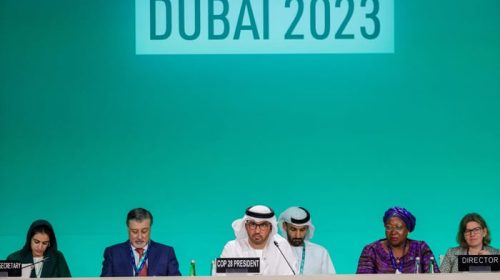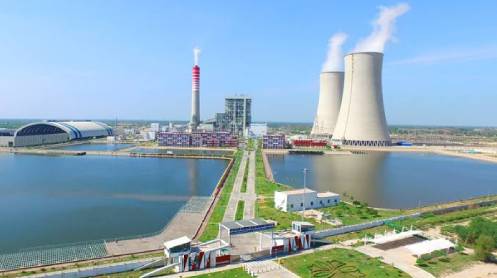Every United Nations Climate Change Conference – or COP – carries the weight of expectation, the pressure to inch closer to a sustainable and climate-resilient future.
COP27 delivered the Loss and Damage Fund, a vital lifeline for communities already bearing the brunt of a changing climate. COP28, which came at the heels of the warmest year recorded in human history, witnessed a different kind of milestone – the mention of “fossil fuels” in the final text, a first in nearly three decades.
But the euphoria quickly dimmed upon closer inspection. The language, watered down to “transitioning away from fossil fuels in a just, orderly and equitable manner”, lacked the teeth needed to bite into the heart of the issue. Fossil Fuel Non-Proliferation Treaty Initiative reported about fossil fuel expansion and exploration just 24 hours after COP28 concluded, and the International Energy Agency has warned that emissions-cutting pledges made by more than 100 countries and 50 fossil fuel firms at the start of COP28 aren’t enough to limit global warming to 1.5 C, a key target enshrined in the Paris Agreement.
While the inclusion of fossil fuels in the final text is a step forward, it’s a small one, leaving countries like Pakistan, on the frontlines of a climate crisis despite negligible emissions. For Pakistan, transitioning away from fossil fuels might ease the burden on its import bill. However, the scars of climate change – floods, droughts, and heatwaves – run deeper than energy dependence. Even if Pakistan becomes a beacon of green energy, the damage wrought by the current trajectory will be irreversible.
The final text’s silence on mandatory action, mainly around climate finance and adaptation, from major polluters exacerbated the existing inequities in the global response to climate change. Finance and fairness, the fuel that drives adaptation and resilience, were woefully absent from COP28’s engine room. Developing countries like Pakistan pleaded for resources to leapfrog the fossil fuel era and build climate-proof communities. But the developed world, responsible for this crisis, looked the other way. While the Loss and Damage Fund marks a positive step, it seems akin to a drop in the ocean. The pledges made ($770 million) barely cover 0.2 per cent of the annual losses faced by vulnerable nations, and its reliance on voluntary contributions is a recipe for uncertainty.
While Pakistan’s voice resonated loud and clear in Dubai, the time for outward appeals has passed. Vulnerable nations stand at the precipice of a climate cliff and cannot afford to be mere bystanders. Instead, for Pakistan, it’s time to turn inward, harness our own resources, and build a climate-proof future based on a combination of governance, innovation, and resourcefulness. This doesn’t require billions of dollars; it requires a strategic shift and a commitment to action.
First, we must tackle the governance gap when it comes to climate action. Climate change is a multi-headed beast, demanding collaboration across federal, provincial, and local levels. Pakistan’s vulnerability to climate change places adaptation at the forefront of our agenda. Unlike global mitigation efforts, adaptation is inherently local. While policymakers often emphasize Pakistan’s susceptibility to climate change and its limited access to climate finance, they seldom discuss the structural deficiencies within our nation.
What we urgently require are inclusive decision-making processes, not stifling bureaucratic silos. Bridging the governance gap hinges on empowering local governments and providing them with the necessary resources and authority. This empowerment fosters an inclusive decision-making process that amplifies diverse voices and perspectives, particularly those closest to the ground, serving as a vital catalyst to unlock finance and implement grassroots-level adaptation.
Second, the potential of the 2017 Climate Change Act remains untapped. It is time to breathe life into this vital document by establishing the Pakistan Climate Change Authority (PCCA), which can become the engine of climate action in Pakistan. The Act not only embodies our commitment to addressing climate change but also grants the PCCA extensive powers and responsibilities. Under its mandate, the PCCA can lead the charge in both mitigation and adaptation efforts, taking a proactive role in shaping our climate policies. Moreover, the PCCA is well-positioned to play a crucial role in crafting bankable projects that not only benefit our environment but also our economy. By leveraging its authority, the PCCA can attract both domestic and international support, fostering collaboration and partnerships that drive sustainable initiatives
Third, Pakistan cannot afford to wait for the mirage of foreign finance to shimmer into reality. While international funding is crucial, we must also take charge of our own climate destiny. It is imperative that we proactively climate-proof every existing and upcoming development project. This responsibility falls squarely on the shoulders of the Ministry of Planning and provincial planning departments. These entities wield the authority and influence to ensure that every step we take in our development journey aligns with a sustainable and climate-resilient future. Let’s start with what we have, and what we can.
There’s no silver bullet, but a combination of different approaches that can be a starting point against the coming climate storm. The World Bank’s Country Climate & Development Report for Pakistan highlighted that “Climate action is the top priority for the government and people of Pakistan,” and it has also provided a combination of approaches such as the imperative for Pakistan to rationalize domestic spending to help bridge climate finance gap by redirecting environmentally damaging subsidies and “ensuring appropriate devolution of responsibilities and resources to local governments.”
The blueprint for a climate-proof Pakistan exists, and the question isn’t whether we can, but whether we will. As the general elections approach, the citizens of Pakistan, especially the young population that represents the majority of the country, will have a chance to elect representatives with a strong climate manifesto and dedication to climate action in their communities. The clock is ticking, and Pakistan must course correct in this crucial decade for climate action.





